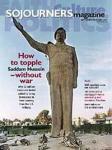The latest suicide bomber blew himself up no more than 300 yards from my Jerusalem apartment. The windows shuddered as the deafening sound filled the air. Then came a moment of silence followed by the loud echo of sirens. A friend who had seen the attack was still traumatized a week later. The vivid images of dead bodies scattered on the road could not be erased. There were seven of them, she said, not counting the wounded.
Another suicide bomber detonated himself on a bus in a different part of town a day earlier. He killed 20 people and wounded many more. Immediately after the assault, I called friends who live close to where the bus exploded to make sure they were okay. These chilling phone calls have become routine in Israel. A busy signal on the other end is considered good news.
Not surprising, the Jerusalem landscape has also changed. Police and military checkpoints have been erected not only on many of the roads leading into the metropolis, but also in the city itself. Every supermarket, bank, cafe, hotel, and restaurant is now obliged to employ security guards who search customers as they enter. Despite these and other measures, many Jerusalemites continue to feel insecure. The once bustling downtown is often empty, since residents prefer to stay home rather than risk a night out on the town. They know that no military operation can stop the suicide bombers.
WHILE THE MEDIA spend much time covering the attacks in West Jerusalem, most commentators have often blurred the difference between the personal and national dimension of the threat. The very real personal threat every Israeli feels when he or she enters a mall, takes a bus, or walks into a crowded pub should not be mistaken for a national threat. The random killings of civilians in no way jeopardize Israel's existence.
Moreover, the media have consistently failed to expose what is happening on the city's occupied east side, where Palestinians live. Like West Jerusalem, the East is also under attack. Not by suicide bombers, of course, but by Israeli authorities. The Jerusalem municipality—headed by Likud Mayor Ehud Olmert—and the military and police have been exploiting the ongoing conflict to accelerate Israel's geographic and demographic conquest of East Jerusalem. The strategy is clear—to strangle and intimidate the Palestinian population.
Several methods are being employed to accomplish this goal, including house demolitions, expulsions, land confiscation, curfews, and the revocation of residency and social benefits. Since the beginning of the year, the municipality has destroyed 25 Palestinian houses and filed demolition orders for hundreds more. This spring several Palestinian families from the Sheikh Jarrah neighborhood were expelled from their homes where they had been living since the 1950s. Not much later, 115 dunams (quarter-acre lots) were confiscated from Palestinian residents of Jabal al-Mukaber in order to build 400 "luxury apartments" for Jews. On the other side of town, in Issawiya, an additional 25 dunams were expropriated to build a military base. All of these techniques have one aim: to systematically reduce the number of Palestinians in the city.
During this same period, the authorities have occasionally imposed curfews as a means of intimidating the Palestinian population. Imagine living in a city where a few hundred yards from your house thousands of people are shut in their homes for days on end simply because they are members of a different ethnic group; children cannot go to school, and adults cannot get to work. As if this collective punishment were not enough, soldiers often walk the streets during curfew throwing stun grenades and shooting at water tankers simply to frighten the population.
The attack on the East is, to be sure, different than the one on the West, particularly in terms of the methods employed. Yet it too is ruthless. The political objective is to ensure Israel's demographic dominance and to create an irreversible situation, whereby Jerusalem cannot be divided and no part of the city returned to the Palestinians.
This attack, unlike the one in the West, constitutes both a personal threat and a national one. And while it is currently less gory than the one perpetrated by suicide bombers, it is sowing dragon's teeth for the future.
Neve Gordon teaches politics at Ben-Gurion University in Beer-Sheva, Israel.

Got something to say about what you're reading? We value your feedback!